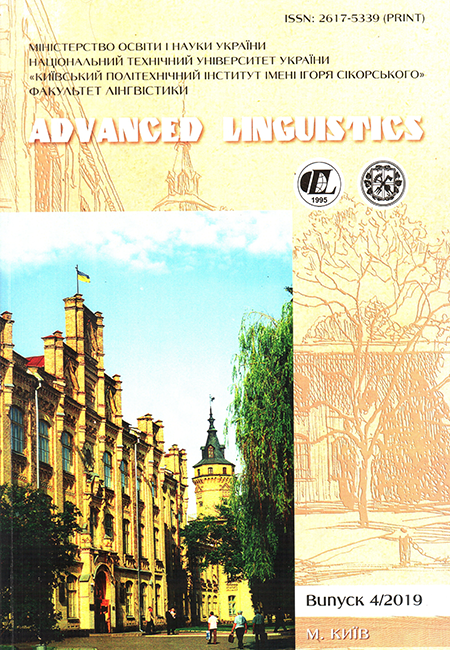VERBALIZATION OF THE COMMUNICATIVE PROVOCATION STRATEGY IN THE COURSE OF INTERVIEW
DOI:
https://doi.org/10.20535/2617-5339.2019.4.183149Ключові слова:
strategy, tactic, communication, speech interaction, provocation.Анотація
This article focuses on the study of the provocation strategy in the interview process. Interview is regarded as a specific genre of texts in press. Main components of communicative situations and typical pragmatic manifestations of texts under study have been analyzed. Units of the interview communicative and pragmatic model have been singled out. Basic stylistic, semantic, and pragmatic figures used to actualize the interview texts authors’ communicative intentions and provocative aims have been examined. We discussed the communicative strategy of provocation as a set of speech actions aimed at addressing the communicative goal of the addressee. The most common scientific approaches to understanding communicative strategies in modern linguistics are summarized, and pragmasemantic features of provocation, its specificity, as well as linguistic and speech means of its realization are specified. Dialogical unity is considered, that makes possible coherence and sequence of speech actions in the process of speech act. Dialogical unity is a collection of language and speech means used to realize a specific communicative goal: the evaluation of events, the expression of emotions, or the urge to act. It is also a complex of tactics, careful selection of which ensures the success of communication in the interview process, managing not only the act of communication, but sometimes the opinion of his interlocutor. The concept of provocation, as a consciously constructed, mostly controlled speech act of dialogical interaction between the addressee and the addressee, is disclosed. The article also provides examples of hedging tactics to avoid direct response. It has been found that most tactics in provocation strategies are characterized by persuasion, that is, trying to persuade anyone to impose a certain point of view. Several types of communicative tactics that implement a strategy of provocation are considered: «direct accusation», «indirect accusation», «expression of no confidence», «irony». Each tactic is intended to provoke a certain reaction from the respondent. It has been found out that the provocation strategy is traced only in dialogical unity, which links the sequence of speech actions in a particular communicative situation.
Посилання
Bacevich, F. S. (2014). Fundamentals of Communicative Linguistics. Kiev: Academy Publishing Center.
Issers, O. S. (2009). A strategy of speech provocation in public dialogue. Moscow.
Stepanenko, M. I. (2016). The valence of the causal propagator and its relation to the semantic and formal-grammatical structure of the sentence. Poltava: ASMI.
Stepanov, V. N. (2017). Provocative discourse of mass communication. St. Petersburg.
Volkova, O. S. (2014). Communicative provocation as a strategy of destructive behavior in domestic conflict. Bulletin of the Volgograd State University, 5 (2).
Bella, T. C. (2018). Trump blasts CNN in 3 am tweet for ‘blaming me’ for bombs. Retrieved 10 November, 2019, from https://www.washingtonpost.com/nation/2018/10/26/trump-blasts-cnn-am-tweet-blaming-me-bombings/
Boffey, D. C. (2019). EU calls on Boris Johnson to publish Brexit plan in full. Retrieved 10 November, 2019, from https://www.theguardian.com/politics/2019/oct/03/eu-calls-on-boris-johnson-to-publish-brexit-plan-in-full
Cadwalladr, C. J. (2013). Andrew Solomon: 'I'm one of five parents with four children in three states'. Retrieved 11 October, 2019, from https://www.theguardian.com/books/2013/feb/16/andrew-solomon-far-from-tree-interview
Mccarthy, T. (2019). Favors, dirt, investigations: key takeaways from the Trump-Ukraine memo. Retrieved 10 November, 2019, from https://www.theguardian.com/us-news/2019/sep/25/trump-ukraine-president
Muir, D. J. (2015). Hillary Clinton’s ‘apology’ interview. Retrieved 9 September, 2019, from https://www.washingtonpost.com/news/the-fix/wp/2015/09/09/annotating-hillary-clintons-apology-interview-with-abc/
Skinner, D. P. (2017). Dennis Skinner: ‘I’ve never done any cross-party stuff I can’t even contemplate it’. Retrieved 10 November, 2019, from https://www.theguardian.com/politics/2017/jul/30/dennis-skinner-never-done-cross-party-stuff-nature-of-the-beast-documentary
Toner, M. C. (2016). Under Secretary for Public Diplomacy and Public Affairs. Retrieved 10 November, 2019, from https://2009-2017.state.gov/r/pa/prs/dpb/2016/06/257911.htm
##submission.downloads##
Опубліковано
Номер
Розділ
Ліцензія
Наше видання використовує положення про авторські права CREATIVE COMMONS для журналів відкритого доступу.
Автори, які публікуються у цьому журналі, погоджуються з наступними умовами:
1. Автори залишають за собою право на авторство своєї роботи та передають журналу право першої публікації цієї роботи на умовах ліцензії Creative Commons Attribution License, котра дозволяє іншим особам вільно розповсюджувати опубліковану роботу з обов'язковим посиланням на авторів оригінальної роботи та першу публікацію роботи у цьому журналі.
2. Автори мають право укладати самостійні додаткові угоди щодо неексклюзивного розповсюдження роботи у тому вигляді, в якому вона була опублікована цим журналом (наприклад, розміщувати роботу в електронному сховищі установи або публікувати у складі монографії), за умови збереження посилання на першу публікацію роботи у цьому журналі.

